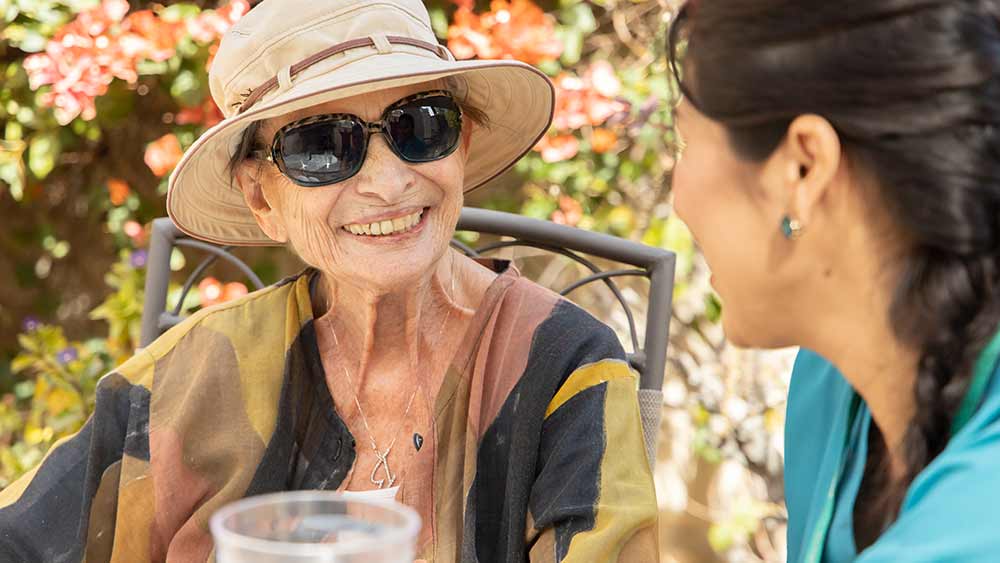

Preventing Vision Loss
With age, comes a variety of changes to your body and your health. For some, this manifests as minor aches and pains, and for others, vision loss. A decline in vision is a common change that happens with age, whether that means needing to use reading glasses and a flashlight to read a menu in a dark restaurant, or whether it means something more severe, like a near-total loss of vision.
Since there is a sliding scale when it comes to aging and vision loss, we’ve put together a breakdown of what you need to know so you can make the right choices for your health and lifestyle.
Types of Vision Loss for Seniors
Although there doesn’t seem to be much data on how many people over the age of 65 typically experience vision loss, according to the American Foundation for the Blind , “The risk of severe eye problems has been found to increase significantly with age, particularly in those over age 65.” Not all vision loss will lead to blindness, however. There are many ways that we can be impacted by vision loss as we age, including the following:
- Cataracts are cloudy areas that form over the lens in the front of the eye. Cataracts “keep light from easily passing through the lens to the back of the eye (the retina), causing blurry vision,” and typically do not hurt. When cataracts are not treated with surgery, they can grow larger and have a negative impact on vision.
- Glaucoma is a buildup of fluid pressure behind the eye that can lead to vision loss and blindness if left untreated. While there is no cure for the condition, there are therapies available to help prevent vision loss.
- Age-related macular degeneration (AMD) impacts the part of the retina that is responsible for detailed vision, such as reading. When someone receives a diagnosis of AMD, there has been damage to that part of the retina, leading to distorted or blurred vision.
- Diabetic retinopathy is a side effect of mismanaged diabetes and occurs when the small blood vessels stop sending blood to the retina properly. Advanced diabetic retinopathy can lead to severe vision loss or blindness. Luckily, if caught early enough, diabetic retinopathy can be treated, primarily by getting blood sugar levels under control.
How to Avoid Vision Loss
Although it might not be possible to completely ward off vision loss altogether, it is within reason to make changes to your lifestyle that will help prevent severe eye problems, or help lead to their early detection. One of the biggest preventive measures you can take is scheduling annual exams with both your physician and an ophthalmologist. For your eye exam, make sure that your doctor is dilating your pupils and checking for glaucoma in addition to simply testing your vision. This can ensure that problems can be treated as they arise, and you can make incremental changes to avoid severe vision issues.
Additionally, the National Institute on Aging recommends the following:
- Protect your eyes from the sun. Choosing to wear sunglasses and hats to protect your eyes from ultraviolet (UV) rays can help keep your vision intact longer. The sun can play a large role in the formation of cataracts and may be a factor in the development of macular degeneration, among other vision issues.
- Manage your diabetes. Since those with diabetes are more prone to experiencing health complications if the disease is not managed properly, getting your blood sugar under control is an important part of maintaining healthy eyes.
- Control your blood pressure. In addition to contributing to cardiovascular disease and stroke, high blood pressure can be responsible for vision loss as you age. High blood pressure can damage blood vessels throughout the body, including the eyes.
- Eat an eye-healthy diet . Foods that are nutrient-dense and high in antioxidants and minerals may help prevent macular degeneration. A diet high in fresh fruits and vegetables, especially those that are yellow, orange, and leafy green, will have the biggest impact on protecting your vision. Additionally, eggs, fish and nuts also help prevent vision loss as you age.
Just because our health becomes more complicated as we age, doesn’t mean that we shouldn’t make necessary changes to attempt to course-correct. By staying on top of our health and maintaining a healthy lifestyle, aging doesn’t have to be synonymous with chronic illness.







